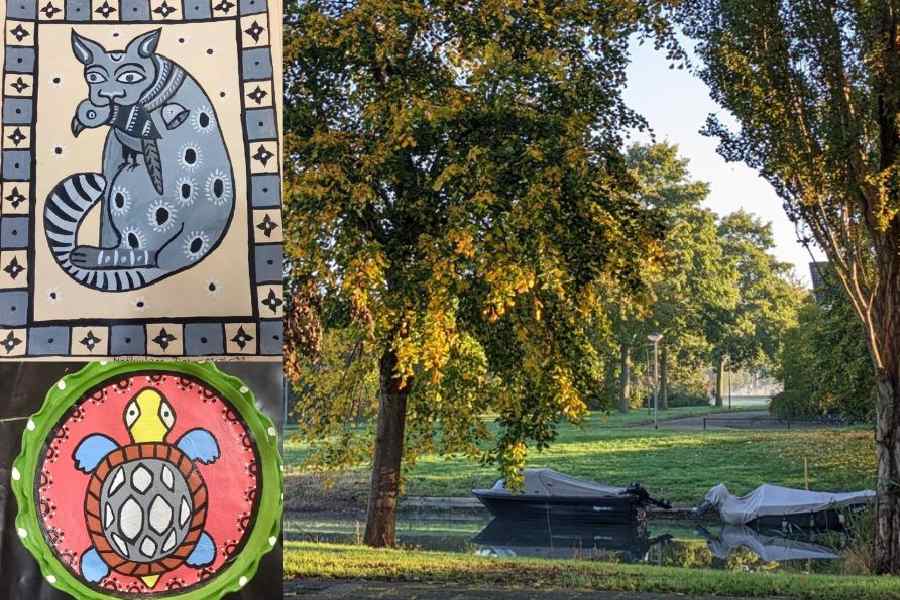A city that has literally risen from the sea and is set to host its first Durga Puja this year is banking on a delta that is being gobbled up by the sea with each passing day.
The two places are continents apart. But Almere, in the heart of the Flevoland province of the Netherlands, and the Sunderbans, the mangrove delta shared by India and Bangladesh, have forged a Durga Puja connection.
More than 10,000 plates, bowls and glasses, all made of paper by women in the Sunderbans, were shipped to Almere in the first week of September.
The Puja bhog will be served to visitors on these plates.
Paintings and merchandise — clay pots, kettles, and lanterns — inspired by the scroll art of the Sunderbans have also reached Almere. The community hall hosting the goddess will be decked out in these, the organisers said.
The puja is being billed as a “completely zero-plastic event”.
“Sustainability is the central theme and the paper products from the Sunderbans fit right in,” said Abhijit Mondal, president of Almere Durga Puja.
Built 50 years ago on what was once the seabed, Almere is the newest city in the Netherlands. It was built on what was the bed of the former Zuiderzee, a shallow bay of North Sea. The opening into the sea was cut off by a dam and the water drained out to create the city.
Almere was built to accommodate the growing population of Amsterdam and the surrounding areas. Some 30km from Amsterdam, Almere, now home to more than 200,000 people, is surrounded by the Ijseelmeer, a giant water body.
A third of the Netherlands lies below sea level. An extensive and sophisticated drainage system — made of dikes, pumps and sand dunes along the coast — keeps the country safe.
The Sunderbans, on the other hand, is sinking every day. Over the past two decades, the sea level in the delta has risen by an alarming 3cm a year on an average, much more than the global average.
"Almere was built on and reclaimed from water. It's pretty ironic that we are working with a delta that, God knows, might go under the sea in the near future. The devastating natural disasters in the Sunderbans haunt us. In collaborating with the women of the Sunderbans, we are celebrating their fortitude," said Satarupa Bose Roy, an organiser of the puja in Almere
This newspaper has earlier reported about the Sunderbans venture making biodegradable products. Besides generating income, it has been reducing the adverse impact of plastic on the fragile ecosystem of the mangrove delta.
This is the second time the products have travelled abroad. Last year, a puja in Eindhoven in the Netherlands had ordered around 3,500 sets, each containing a plate, bowl and a glass.
Each set was sold for Rs 12 this year.
"There are some people in the Netherlands who are associated with both the pujas. They got interested in our work and wanted to showcase it," said Sourav Mukherjee, founder of the Kolkata Society for Cultural Heritage, which has been supporting the ven ture in the Sunderbans.
The production unit in Jharkhali, which started with around 40 women in 2021, now employs around 130 women.
"The association with the Almere Puja will empower the women of the Sunderbans. Their interest in the scroll art merchandise is also very encouraging," said Mukherjee.
"Almere is billed as the most environment-friendly city in the Netherlands. The gemeente (municipal body) puts in a lot of effort in waste segregation at source. For the Durga Puja, we have tied up with the gemeente to showcase sustainability in various ways. Durga Puja is also a form of worshipping the Nature," said Tapabrata Roy, vice-president of the puja
